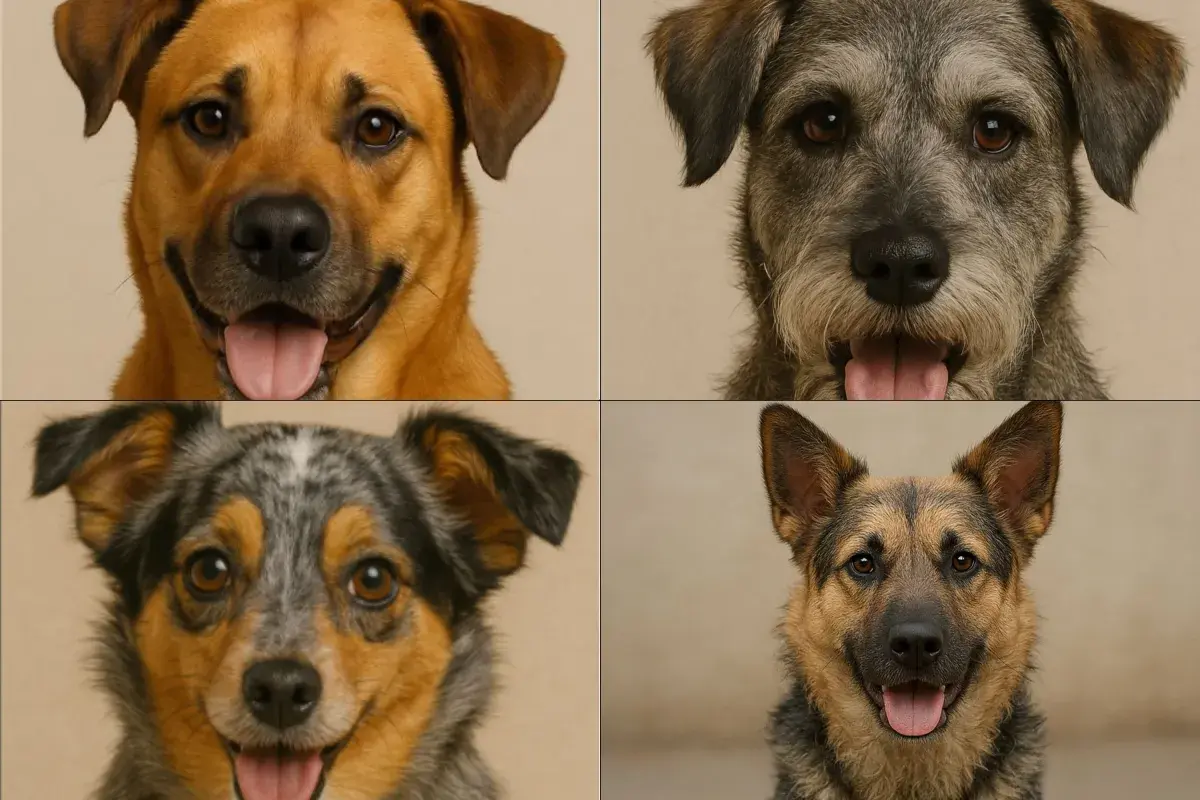
When it comes to dog breeds, the diversity is vast and constantly expanding, with an endless number of mixed-breed possibilities.
The American Kennel Club said that, despite recognizing nearly 200 breeds, there are more than 340 worldwide.
Some “accidents” have resulted in unusual, yet adorable dog mixes—sometimes followed by criticism of the cross-breeding due to the unpredictability of health and behavior—while others have become well-known “designer” breeds, such as the Labradoodle.
The canine classification becomes more complex when you factor in mixed breeds as the parents themselves. Pinpointing the exact DNA makeup of a dog is nearly impossible; thus, the surge of doggy DNA testing in recent years—along with human testing, including 23andMe—as the science became more refined.
The global dog DNA testing market is expected to reach $723 million by 2030, growing at a rate of about 15.1 percent annually, Newsweek previously reported.
But before DNA testing came the guessing game. Newsweek asked ChatGPT to create a photo of a mixed-breed dog based on the real DNA results shared by five separate owners. Do you think you can correctly guess the breed? Take a look at the slideshow below and take note of your guesses, then check how they stack up with the answers later in the article.
What ChatGPT Created
1 of 5
The owner of the first dog, mocked up by ChatGPT, originally thought she had adopted a golden retriever puppy, but the DNA revealed zero percent of the breed she expected. Based on the dog’s DNA results, here is what ChatGPT created. Adorable right?
Next up is the stray that dog owner Jay took in after a hurricane ripped through the area. Despite not knowing the dog’s history, Jay always thought he knew the breed, but the DNA results proved otherwise.
Doggo No. 3, Waffles, convinced the owner he was high-class royalty, also known as a corgi, based on his shelter picture. But curiosity set in, as corgis are rare to find up for adoption, Newsweek previously reported. The owner opted for a DNA test. The third image shows what ChatGPT created based on those results.
Archibald is our dog No. 4. Owner Zoë took the animal shelter’s word for what type of dog she adopted—mini schnauzer and poodle mix—but the DNA result left her speechless, especially as she expected her dog to stay little.
Finally, dog No. 5, Lyle, was adopted out of a shelter in Louisiana, and now he lives in New York with his owners, who thought his breed to be a flat-coated retriever, closely related to the Labrador retriever. They even conducted a Google reverse image search, which appeared to agree, but after a look at his siblings, they decided to test his DNA. Any last-minute guesses?
Results
Now for the results. Meet puppy No. 1, aka Loki George. Did you guess the majority to be German shepherd? The DNA test revealed 29 percent German shepherd, 26 percent beagle, 23.3 percent supermutt—a term for a dog with ancestry from multiple different breeds but the DNA being too small to assign to a particular one—and 21.7 percent Siberian husky.
The pup’s owner, Gina DiLello, previously told Newsweek: “No golden retriever! No yellow lab! German shepherd we could see. But beagle, Siberian husky!? I needed Reddit’s opinion on this and was validated in my shock. But no matter what the results we think he is the most perfect dog in the world.”
Jay, the owner of Dog no. 2 always thought his rescue fur baby, Zelda, was a West Highlander terrier, given her bright white fur. But the vet was closest after guessing a schnauzer mix. The DNA result came back as 50 percent schnauzer, 21.3 percent mountain cur, 18.8 percent supermutt, followed by Labrador retriever at 6.3 percent and golden retriever at 3.6 percent.
“I had prepared myself for her being just about anything, but seeing three large hunting breeds in there was certainly a shock,” Jay told Newsweek.
The corgi-hopeful owner learned his dog was anything but the queen’s dog. Waffles’ DNA test came back as 34.9 percent Australian shepherd, 26.5 percent Australian cattle dog, 23.7 percent Chihuahua and 14.9 percent miniature Australian shepherd. Zero corgi breed was found in his DNA.
Owner Daniel Sarche previously told Newsweek that the results make sense the more he gets to know Waffles: “For one thing, he doesn’t shed pretty much at all. For another, he is much less sassy and vocal and stubborn than I have heard that corgis tend to be – he’s definitely able to ask for what he wants, but he’s super gentle and willing to do what I ask him to do too. He is also a fast little dog and can easily keep up with me at my fastest sprint pace. Must be the Aussie shepherd in him.”
The ChatGPT image likely made you guess German shepherd, and if so, you’re correct. The DNA result for Archibald came back 40.4 percent German shepherd, 24.4 percent supermutt, 19.1 percent poodle and 16.1 percent mini schnauzer. However, based on his pictures, the mini schnauzer has taken over.
The 5-month-old pup rocks black fur and pointy ears. Owner Zoë thought the German shepherd came out of left field, but looking back, she said, she can see aspects of the breed, such as his giant hind legs. The results estimate the pup will weigh up to 50 pounds.
Last but not least, we have Lyle, another German shepherd-prominent mix. The DNA results revealed Lyle to be 19 percent German shepherd, 16.6 percent supermutt, 16 percent Labrador retriever, 15.5 percent American pit bull terrier, 11.1 percent Australian shepherd, 8 percent chow chow and 7.9 percent boxer, among others.
The family started to suspect the shepherd in Lyle after he started showing his personality. The owner told Newsweek: “He had a lot of herding instincts, and he was such a ‘Velcro dog’ and gave us very little privacy.”